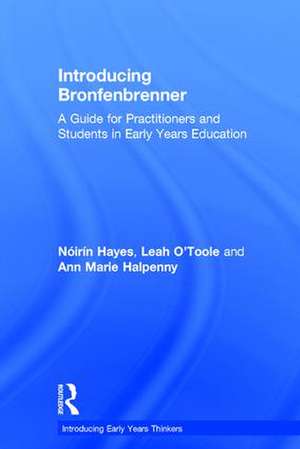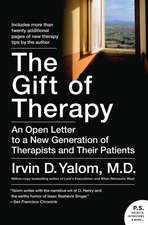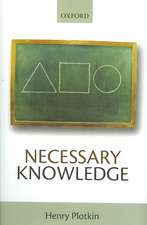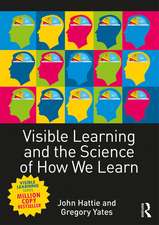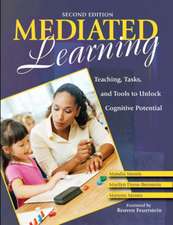Introducing Bronfenbrenner: A Guide for Practitioners and Students in Early Years Education: Introducing Early Years Thinkers
Autor Nóirín Hayes, Leah O'Toole, Ann Marie Halpennyen Limba Engleză Hardback – 13 mar 2017
As well as providing a glossary of key terms, Introducing Bronfenbrenner covers areas such as:
- a bioecological perspective on educational transition;
- early education as a dynamic process;
- nurturing children’s learning and development;
- reflecting the bioecological in early years practice.
| Toate formatele și edițiile | Preț | Express |
|---|---|---|
| Paperback (1) | 278.03 lei 6-8 săpt. | |
| Taylor & Francis – 23 noi 2022 | 278.03 lei 6-8 săpt. | |
| Hardback (2) | 898.57 lei 6-8 săpt. | |
| Taylor & Francis – 23 noi 2022 | 898.57 lei 6-8 săpt. | |
| Taylor & Francis – 13 mar 2017 | 1037.38 lei 6-8 săpt. |
Preț: 1037.38 lei
Preț vechi: 1139.97 lei
-9% Nou
Puncte Express: 1556
Preț estimativ în valută:
198.50€ • 207.25$ • 164.29£
198.50€ • 207.25$ • 164.29£
Carte tipărită la comandă
Livrare economică 05-19 aprilie
Preluare comenzi: 021 569.72.76
Specificații
ISBN-13: 9781138182813
ISBN-10: 1138182818
Pagini: 184
Ilustrații: 2
Dimensiuni: 156 x 234 mm
Greutate: 0.41 kg
Ediția:1
Editura: Taylor & Francis
Colecția Routledge
Seria Introducing Early Years Thinkers
Locul publicării:Oxford, United Kingdom
ISBN-10: 1138182818
Pagini: 184
Ilustrații: 2
Dimensiuni: 156 x 234 mm
Greutate: 0.41 kg
Ediția:1
Editura: Taylor & Francis
Colecția Routledge
Seria Introducing Early Years Thinkers
Locul publicării:Oxford, United Kingdom
Public țintă
Adult education, Postgraduate, Professional, and UndergraduateCuprins
Glossary 1. Introducing Brofenbrenner 2. The Bioecological Model of Human Development 3. Proximal Processes and Relationships 4. Understanding Development in Context 5. A Bioecological Perspective on Educational Transition 6. Locating the Child at the Centre of Practice 7. Creating Rich Learning Environments 8. Early Education as a Dynamic Process 9. Nurturing Children’s Learning and Development 10. Reflecting the Bioecological in Early Years Practice
Notă biografică
Professor Nóirín Hayes is a developmental psychologist. She is Visiting Professor at the School of Education, Trinity College Dublin and Professor [Emeritus], Dublin Institute of Technology.
Dr Leah O’Toole lectures in Psychology at Marino Institute of Education, an Associated College of Trinity College Dublin.
Dr Ann Marie Halpenny is Lecturer in Psychology in the School of Languages, Law and Social Sciences at Dublin Institute of Technology. She has previously published with Routledge.
Dr Leah O’Toole lectures in Psychology at Marino Institute of Education, an Associated College of Trinity College Dublin.
Dr Ann Marie Halpenny is Lecturer in Psychology in the School of Languages, Law and Social Sciences at Dublin Institute of Technology. She has previously published with Routledge.
Recenzii
"I love this book, and wish I’d written it! The authors describe Bronfenbrenner’s theory in its most up-to-date version, and do so in very accessible language. They clearly explain the theory’s relevance for early childhood scholars and educators, and do so using a wealth of examples drawn from their own observations in classrooms and from research. Children’s typically occurring activities and interactions with peers and teachers feature throughout, and the authors show how the children’s own characteristics and the environment (including the classroom setup, the children’s home background, and the broader socio-cultural context) influence those activities and interactions. The authors also invite their readers to reflect on their own experiences in light of the relevant theoretical concepts, and at the end of all but the first and last chapters appear carefully considered "implications" and "key concepts" for practice." - Jonathan Tudge, Department of Human Development and Family Studies, UNC-Greensboro, USA.
"Although Bronfenbrenner was one of our great public intellectuals, his legacy has been understood in terms of a static systems model which explains, rather than challenges, inequality and disadvantage. In this new book, this legacy is revealed instead as a complex and dynamic account of relationships and interactions. The authors explore how Bronfenbrenner developed his description of the network of influences which shape children’s lives, emphasising the processes, rather than the contexts, within which development takes place. In unravelling this interplay between people and places they show how transformative processes can be set in motion by early childhood practitioners in their daily work with young children and their families." - Liz Brooker, Emeritus Reader, University College London Institute of Education
"I love this book, and wish I’d written it! The authors describe Bronfenbrenner’s theory in its most up-to-date version, and do so in very accessible language. They clearly explain the theory’s relevance for early childhood scholars and educators, and do so using a wealth of examples drawn from their own observations in classrooms and from research. Children’s typically occurring activities and interactions with peers and teachers feature throughout, and the authors show how the children’s own characteristics and the environment (including the classroom setup, the children’s home background, and the broader socio-cultural context) influence those activities and interactions. The authors also invite their readers to reflect on their own experiences in light of the relevant theoretical concepts, and at the end of all but the first and last chapters appear carefully considered "implications" and "key concepts" for practice." - Jonathan Tudge, Department of Human Development and Family Studies, UNC-Greensboro, USA.
"Although Bronfenbrenner was one of our great public intellectuals, his legacy has been understood in terms of a static systems model which explains, rather than challenges, inequality and disadvantage. In this new book, this legacy is revealed instead as a complex and dynamic account of relationships and interactions. The authors explore how Bronfenbrenner developed his description of the network of influences which shape children’s lives, emphasising the processes, rather than the contexts, within which development takes place. In unravelling this interplay between people and places they show how transformative processes can be set in motion by early childhood practitioners in their daily work with young children and their families." - Liz Brooker, Emeritus Reader, University College London Institute of Education
"In a necessarily short endorsement it is hard to capture the wealth of thinking in this highly readable book. Far from static, Bronfenbrenner’s work is presented as dynamic, evolving and rich. Powerful concepts which the authors present accessibly but accompanied by provocative and reflective questions for early years practitioners will be a call to make linkages to practice. In promoting the applications of a bio-ecological approach to early years, the authors are encouraging a form of practitioner-activism, which sees small children as active in their own learning and development in collaboration with others around them and together in the environments in which they spend their lives. A great contribution to the early years field." - Professor Aline-Wendy Dunlop, University of Strathclyde
"I love this book, and wish I’d written it! The authors describe Bronfenbrenner’s theory in its most up-to-date version, and do so in very accessible language. They clearly explain the theory’s relevance for early childhood scholars and educators, and do so using a wealth of examples drawn from their own observations in classrooms and from research. Children’s typically occurring activities and interactions with peers and teachers feature throughout, and the authors show how the children’s own characteristics and the environment (including the classroom setup, the children’s home background, and the broader socio-cultural context) influence those activities and interactions. The authors also invite their readers to reflect on their own experiences in light of the relevant theoretical concepts, and at the end of all but the first and last chapters appear carefully considered "implications" and "key concepts" for practice." - Jonathan Tudge, Department of Human Development and Family Studies, UNC-Greensboro, USA.
"Although Bronfenbrenner was one of our great public intellectuals, his legacy has been understood in terms of a static systems model which explains, rather than challenges, inequality and disadvantage. In this new book, this legacy is revealed instead as a complex and dynamic account of relationships and interactions. The authors explore how Bronfenbrenner developed his description of the network of influences which shape children’s lives, emphasising the processes, rather than the contexts, within which development takes place. In unravelling this interplay between people and places they show how transformative processes can be set in motion by early childhood practitioners in their daily work with young children and their families." - Liz Brooker, Emeritus Reader, University College London Institute of Education
"In a necessarily short endorsement it is hard to capture the wealth of thinking in this highly readable book. Far from static, Bronfenbrenner’s work is presented as dynamic, evolving and rich. Powerful concepts which the authors present accessibly but accompanied by provocative and reflective questions for early years practitioners will be a call to make linkages to practice. In promoting the applications of a bio-ecological approach to early years, the authors are encouraging a form of practitioner-activism, which sees small children as active in their own learning and development in collaboration with others around them and together in the environments in which they spend their lives. A great contribution to the early years field." - Professor Aline-Wendy Dunlop, University of Strathclyde
"Although Bronfenbrenner was one of our great public intellectuals, his legacy has been understood in terms of a static systems model which explains, rather than challenges, inequality and disadvantage. In this new book, this legacy is revealed instead as a complex and dynamic account of relationships and interactions. The authors explore how Bronfenbrenner developed his description of the network of influences which shape children’s lives, emphasising the processes, rather than the contexts, within which development takes place. In unravelling this interplay between people and places they show how transformative processes can be set in motion by early childhood practitioners in their daily work with young children and their families." - Liz Brooker, Emeritus Reader, University College London Institute of Education
"I love this book, and wish I’d written it! The authors describe Bronfenbrenner’s theory in its most up-to-date version, and do so in very accessible language. They clearly explain the theory’s relevance for early childhood scholars and educators, and do so using a wealth of examples drawn from their own observations in classrooms and from research. Children’s typically occurring activities and interactions with peers and teachers feature throughout, and the authors show how the children’s own characteristics and the environment (including the classroom setup, the children’s home background, and the broader socio-cultural context) influence those activities and interactions. The authors also invite their readers to reflect on their own experiences in light of the relevant theoretical concepts, and at the end of all but the first and last chapters appear carefully considered "implications" and "key concepts" for practice." - Jonathan Tudge, Department of Human Development and Family Studies, UNC-Greensboro, USA.
"Although Bronfenbrenner was one of our great public intellectuals, his legacy has been understood in terms of a static systems model which explains, rather than challenges, inequality and disadvantage. In this new book, this legacy is revealed instead as a complex and dynamic account of relationships and interactions. The authors explore how Bronfenbrenner developed his description of the network of influences which shape children’s lives, emphasising the processes, rather than the contexts, within which development takes place. In unravelling this interplay between people and places they show how transformative processes can be set in motion by early childhood practitioners in their daily work with young children and their families." - Liz Brooker, Emeritus Reader, University College London Institute of Education
"In a necessarily short endorsement it is hard to capture the wealth of thinking in this highly readable book. Far from static, Bronfenbrenner’s work is presented as dynamic, evolving and rich. Powerful concepts which the authors present accessibly but accompanied by provocative and reflective questions for early years practitioners will be a call to make linkages to practice. In promoting the applications of a bio-ecological approach to early years, the authors are encouraging a form of practitioner-activism, which sees small children as active in their own learning and development in collaboration with others around them and together in the environments in which they spend their lives. A great contribution to the early years field." - Professor Aline-Wendy Dunlop, University of Strathclyde
"I love this book, and wish I’d written it! The authors describe Bronfenbrenner’s theory in its most up-to-date version, and do so in very accessible language. They clearly explain the theory’s relevance for early childhood scholars and educators, and do so using a wealth of examples drawn from their own observations in classrooms and from research. Children’s typically occurring activities and interactions with peers and teachers feature throughout, and the authors show how the children’s own characteristics and the environment (including the classroom setup, the children’s home background, and the broader socio-cultural context) influence those activities and interactions. The authors also invite their readers to reflect on their own experiences in light of the relevant theoretical concepts, and at the end of all but the first and last chapters appear carefully considered "implications" and "key concepts" for practice." - Jonathan Tudge, Department of Human Development and Family Studies, UNC-Greensboro, USA.
"Although Bronfenbrenner was one of our great public intellectuals, his legacy has been understood in terms of a static systems model which explains, rather than challenges, inequality and disadvantage. In this new book, this legacy is revealed instead as a complex and dynamic account of relationships and interactions. The authors explore how Bronfenbrenner developed his description of the network of influences which shape children’s lives, emphasising the processes, rather than the contexts, within which development takes place. In unravelling this interplay between people and places they show how transformative processes can be set in motion by early childhood practitioners in their daily work with young children and their families." - Liz Brooker, Emeritus Reader, University College London Institute of Education
"In a necessarily short endorsement it is hard to capture the wealth of thinking in this highly readable book. Far from static, Bronfenbrenner’s work is presented as dynamic, evolving and rich. Powerful concepts which the authors present accessibly but accompanied by provocative and reflective questions for early years practitioners will be a call to make linkages to practice. In promoting the applications of a bio-ecological approach to early years, the authors are encouraging a form of practitioner-activism, which sees small children as active in their own learning and development in collaboration with others around them and together in the environments in which they spend their lives. A great contribution to the early years field." - Professor Aline-Wendy Dunlop, University of Strathclyde
Descriere
This book presents an introduction to Bronfenbrenner’s model of development, drawing on practice-based research to identify and animate key elements of his model’s impact. It illustrates how his model can help bring quality to early learning environments and incorporates it into daily work with young children.
